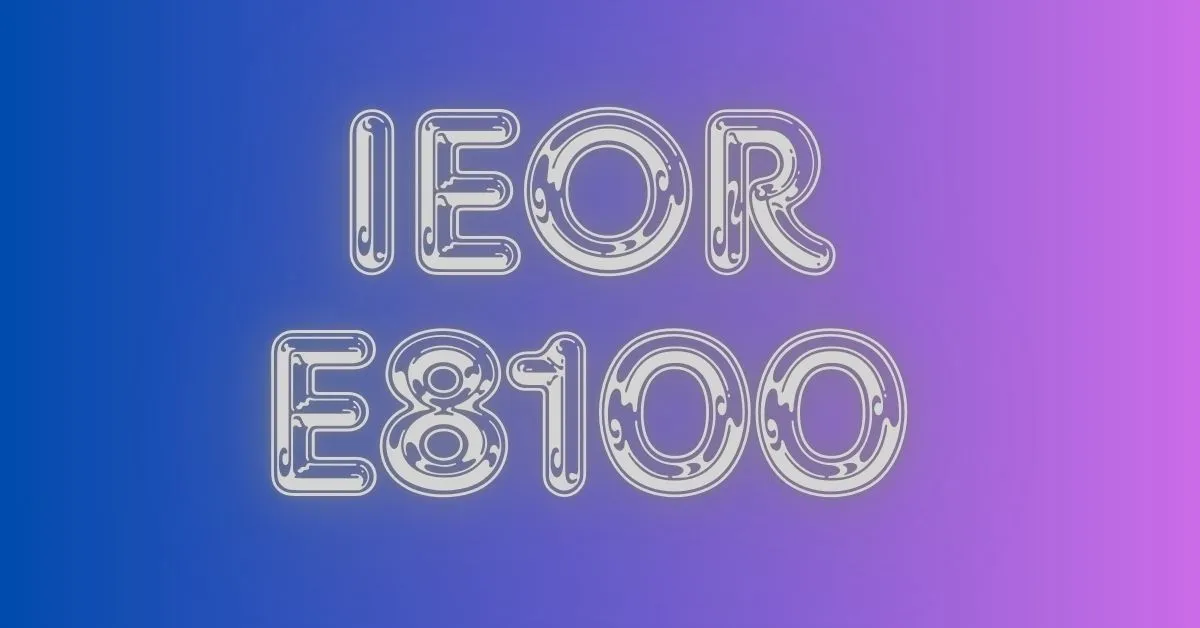Unlocking the Future: A Deep Dive into IEOR E8100
In today’s fast-paced world, the ability to make informed, data-driven decisions is crucial for success across various industries. Enter IEOR E8100, a course designed to bridge the gap between theoretical concepts in operations research and practical applications in real-world settings. This course equips students with the skills necessary to tackle complex operational challenges, ensuring they emerge as leaders in their fields. In this comprehensive guide, we will explore the multifaceted aspects of IEOR E8100, its significance, and the transformative learning experiences it offers.
Understanding Operations Research
What is Operations Research?
Operations research (OR) is a discipline that uses advanced analytical methods to help make better decisions. It encompasses various techniques, including mathematical modeling, statistical analysis, and optimization. OR originated during World War II when military operations required efficient logistics and resource allocation. Over the decades, its applications have expanded to numerous sectors, including healthcare, finance, transportation, and manufacturing.
The Evolution of Operations Research
Operations research has evolved significantly since its inception. Initially focused on military applications, OR now plays a pivotal role in industries such as:
- Healthcare: Optimizing patient flow and resource management.
- Transportation: Enhancing routing and scheduling for efficiency.
- Finance: Assessing risks and optimizing investment strategies.
The evolution of OR methodologies, including linear programming, simulation, and data analytics, reflects the increasing complexity of problems faced by organizations today.
The Structure of IEOR E8100
Course Overview
IEOR E8100, titled “Bridging Theory and Practice in Operations Research is a graduate-level course that emphasizes the integration of theoretical frameworks with practical applications. This course provides students with a comprehensive understanding of operations research methodologies and equips them with tools to solve real-world problems.
Key Learning Objectives
- Understanding Theoretical Foundations: Students gain a robust understanding of key theoretical concepts in operations research, including optimization, stochastic processes, and decision-making frameworks.
- Practical Application: The course emphasizes hands-on experiences where students apply theoretical models to real-world scenarios. This approach helps students bridge the gap between classroom learning and industry practices.
- Problem-Solving Skills: Participants develop critical problem-solving skills, enabling them to analyze complex issues and devise effective strategies.
- Collaboration and Communication: Group projects foster teamwork and enhance communication skills, preparing students for collaborative work environments.
Course Content Breakdown
IEOR E8100 typically covers a variety of topics, including:
- Mathematical Modeling: Students learn to construct and analyze mathematical models that represent real-world systems. This foundational skill is crucial for any operations researcher.
- Optimization Techniques: Various optimization methods, such as linear and nonlinear programming, are explored. Students learn how to identify the best solutions among competing alternatives.
- Simulation and Risk Analysis: The course teaches simulation techniques to model complex systems and assess risks associated with uncertainty in decision-making.
- Case Studies and Projects: Students engage in real-world case studies, often collaborating with industry partners. These projects provide valuable insights and practical experience.
The Importance of Bridging Theory and Practice
Why Is It Essential?
Bridging theory and practice in operations research is vital for several reasons:
- Enhanced Decision-Making: Theoretical frameworks provide the foundation for analysis, but practical applications reveal complexities and nuances that are often overlooked in academia.
- Continuous Improvement: Real-world applications allow students to refine their models based on actual performance data, fostering a mindset of continuous improvement.
- Innovation and Adaptability: Industry challenges can inspire new theoretical developments. Practitioners contribute valuable insights that enhance academic discourse, promoting innovation in the field.
- Skill Development: Hands-on experiences enable students to see the tangible results of their analyses, cultivating adaptability in evolving environments.
Real-World Applications of Operations Research
Operations research methodologies are integral to various industries, significantly enhancing decision-making and optimizing complex systems. Here are a few examples:
- Healthcare: OR techniques are used to streamline patient flow, manage resources, and improve care delivery. Hospitals can analyze data to reduce wait times and enhance operational efficiency.
- Transportation: Shipping companies apply OR methods to determine the most efficient routes, saving time and reducing costs while minimizing environmental impact.
- Retail: Retailers leverage operations research to analyze customer behavior, optimize inventory management, and develop effective pricing strategies.
- Finance: Financial institutions use OR to assess risks, allocate assets, and improve investment strategies, enabling better financial decision-making.
The Role of Mathematical Modeling in IEOR E8100
Why Mathematical Modeling Matters
Mathematical modeling is the backbone of operations research. It transforms complex real-world problems into quantifiable formats, allowing researchers and practitioners to test various scenarios and predict outcomes effectively. Here’s how it works:
- Representing Relationships: A mathematical model captures relationships between different variables, whether optimizing supply chains or enhancing resource allocation.
- Visualization of Impact: Models enable professionals to visualize potential impacts before implementing strategies, facilitating informed decision-making.
- Common Language: Mathematical models provide a common language for stakeholders to discuss intricate concepts, enhancing collaboration across disciplines.
Types of Models Covered
IEOR E8100 explores different types of mathematical models, including:
- Linear Models: Used for problems with linear relationships among variables.
- Non-Linear Models: Applicable when relationships are non-linear, requiring more complex optimization techniques.
- Stochastic Models: These models incorporate randomness, making them suitable for situations with uncertainty, such as demand forecasting.
Engaging Case Studies and Projects
Hands-On Learning Experiences
One of the standout features of IEOR E8100 is its emphasis on case studies and projects. Students engage with real-world challenges, providing them with invaluable practical experience. Here’s a closer look at some potential projects:
- Supply Chain Optimization: Students work with retail companies to analyze and optimize their supply chain logistics. They identify bottlenecks and propose solutions to enhance efficiency.
- Healthcare Efficiency: In this project, students model patient flow in hospitals to decrease wait times while maintaining high-quality care. They learn to balance operational efficiency with patient satisfaction.
- Transportation Routing: Students collaborate with transportation firms to develop efficient routing solutions that minimize costs and environmental impact.
These projects not only enhance understanding but also build essential teamwork and communication skills.
Benefits of Taking IEOR E8100
Why Enroll in This Course?
Taking IEOR E8100 offers a wealth of opportunities for aspiring professionals. Here are some key benefits:
- Skill Development: Participants enhance their analytical skills and learn to apply theoretical concepts to real-world challenges, making them valuable assets in any organization.
- Networking Opportunities: Engaging with peers and instructors fosters connections that can lead to internships or job offers.
- Immediate Contribution: The hands-on projects prepare graduates for immediate contributions in various sectors, as employers often seek candidates who can hit the ground running.
- Competitive Advantage: Mastering mathematical modeling techniques provides a significant edge in decision-making processes, especially as businesses strive to optimize operations amidst growing competition.
Career Opportunities
Graduates of IEOR E8100 are well-equipped for diverse career paths in operations research and related fields. Potential roles include:
- Operations Analyst
- Data Scientist
- Supply Chain Manager
- Financial Analyst
- Healthcare Consultant
The skills gained in this course are increasingly sought after as organizations navigate the complexities of today’s data-driven landscape.
Conclusion
The journey through IEOR E8100 offers a unique blend of theoretical insights and practical applications in operations research. As the field continues to evolve, professionals equipped with knowledge from this course are poised to make significant contributions across various industries.
Operations research is not just about crunching numbers; it’s about solving real-world problems that impact businesses and communities. Those who delve into the complexities of mathematical modeling will find themselves at the forefront of innovative solutions. The hands-on experiences embedded within IEOR E8100 allow students to apply concepts meaningfully, enhancing their learning journey.
For future professionals, taking IEOR E8100 means stepping into a realm where theory meets reality. The skills gained here are invaluable tools for navigating today’s dynamic work environments. As operations research continues its trajectory towards greater relevance in our data-driven world, those familiar with courses like IEOR E8100 will undoubtedly be leaders in shaping its future landscape.
By engaging deeply with the content of this course, students not only prepare themselves for successful careers but also contribute to the ongoing evolution of operations research, ensuring that they are ready to meet the challenges of tomorrow head-on.
FAQs
What is IEOR E8100?
IEOR E8100 is a graduate-level course focused on bridging theory and practice in operations research.
What topics are covered in IEOR E8100?
The course covers mathematical modeling, optimization techniques, simulation, and real-world case studies.
How does the course enhance practical skills?
Students engage in hands-on projects that apply theoretical concepts to real-world operational challenges.
What career opportunities does IEOR E8100 prepare students for?
Graduates can pursue roles such as operations analyst, data scientist, or supply chain manager.
Why is mathematical modeling important in operations research?
Mathematical modeling helps represent complex problems quantitatively, facilitating effective decision-making.







